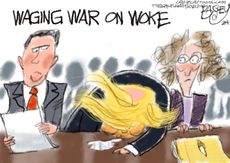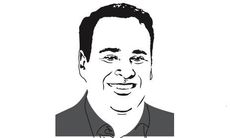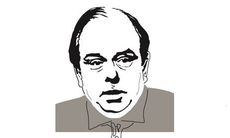Washington's deficit-hawk pretenders
Even if the GOP's spending cuts are larger than Obama's, they would fritter away the proceeds on tax cuts and repealing health-care reform
The Obama administration's proposed spending freeze promises to reduce certain categories of government spending over the next decade by $400 billion. This is a bad idea. It will cut not fat, but muscle. It will leave our country worse off. So why cut important spending instead of scrapping unnecessary excess? The fat is jealously guarded by Senators from states with small populations. And Obama's spending freeze on non-defense discretionary spending targets the muscle.
By contrast, we do not know what the Republican House's long-term budget proposal would cut. They have not told us. Perhaps it will cut non-defense discretionary spending by a total of $800 billion over the next decade, relative to
its baseline level. Perhaps it will not do anything. Perhaps it will cut muscle and add to fat and leave us about where we are now. We really do not know.
Subscribe to The Week
Escape your echo chamber. Get the facts behind the news, plus analysis from multiple perspectives.

Sign up for The Week's Free Newsletters
From our morning news briefing to a weekly Good News Newsletter, get the best of The Week delivered directly to your inbox.
From our morning news briefing to a weekly Good News Newsletter, get the best of The Week delivered directly to your inbox.
Suppose the Republican plan actually does cut spending by $800 billion. The House Republicans then want to take that $800 billion, and spend $200 billion of it trying to repeal health care reform. They then want to take what's left, and use it to pay for extending the Bush marginal tax rate reductions on high-earning Americans. But it will not stretch quite that far. Extending those Bush tax cuts is projected to cost $750 billion, and there is only $600 billion left in this hypothetical scenario. There's a $150 billion shortfall.
The Obama proposal looks to reduce debt 10 years from now, by $400 million. This theoretical House Republican proposal looks to increase the debt 10 years from now, by $150 billion.
And over the past 30 years, Democratic budget proposals have by and large delivered what they promised. Republican proposals, by contrast, have all turned out to produce much bigger deficits than were pledged at the start.
If you are a real deficit hawk, there is simply no contest as to which political party you should support right now.
Sign up for Today's Best Articles in your inbox
A free daily email with the biggest news stories of the day – and the best features from TheWeek.com
But there are a lots of people in Washington who are paid in either dollars or favor points to pretend to be deficit hawks when they are no such thing.
Create an account with the same email registered to your subscription to unlock access.
Brad DeLong is a professor in the Department of Economics at U.C. Berkeley; chair of its Political Economy major; a research associate at the National Bureau of Economic Research; and from 1993 to 1995 he worked for the U.S. Treasury as a deputy assistant secretary for economic policy. He has written on, among other topics, the evolution and functioning of the U.S. and other nations' stock markets, the course and determinants of long-run economic growth, the making of economic policy, the changing nature of the American business cycle, and the history of economic thought.
-
 'Good riddance to the televised presidential debate'
'Good riddance to the televised presidential debate'Instant Opinion Opinion, comment and editorials of the day
By Harold Maass, The Week US Published
-
 Caitlin Clark the No. 1 pick in bullish WNBA Draft
Caitlin Clark the No. 1 pick in bullish WNBA DraftSpeed Read As expected, she went to the Indiana Fever
By Peter Weber, The Week US Published
-
 Today's political cartoons - April 16, 2024
Today's political cartoons - April 16, 2024Cartoons Tuesday's cartoons - sleepyhead, little people, and more
By The Week US Published
-
 The GOP's health-care dilemma
The GOP's health-care dilemmafeature Coverage for all: We do it, why not say it?
By David Frum Last updated
-
 A realistic plan for reforming health care
A realistic plan for reforming health carefeature Repeal isn't going to happen. Instead, Republicans should focus on fixing financing and over-regulation
By David Frum Last updated
-
 ObamaCare's stealth assault on small business
ObamaCare's stealth assault on small businessfeature An obscure provision in the new health-care law will require entrepreneurs to spend a great deal more time filling out tax forms. It’s not the sort of change that should have been sneaked through
By David Frum Last updated
-
 Obama will return to health care
Obama will return to health carefeature With financial reform underway and immigration reform coming next, it appears Barack Obama has moved on from the health-care debate. Just wait
By Robert Shrum Last updated
-
 How immigration reform threatens health reform
How immigration reform threatens health reformopinion If immigration reform legalizes the 10-12 million illegal immigrants in the U.S., who pays for their ObamaCare?
By David Frum Last updated
-
The curious triumph of RomneyCare
feature Neither Democrats nor Republicans have an incentive to discuss the Republican roots of Obama's health-care plan. But that doesn't mean they're not real—and deep
By Brad DeLong Last updated
-
 Heroes and villains of health reform
Heroes and villains of health reformfeature It's not over—yet. But here's how history will record the profiles in courage and cowardice we've witnessed in the health-reform battle.
By Robert Shrum Last updated
-
 Will health reform cause the next bailout?
Will health reform cause the next bailout?feature President Obama has escalated his attacks on insurers. But if reform passes, his harsh words may be the prelude to an embrace
By David Frum Last updated